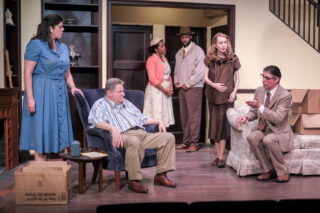One house, two acts and a span of fifty years set the stage for Bruce Norris’ 2010 play Clybourne Park, Elmwood Playhouse’s second production of their 76th season. The Tony and Pulitzer award-winning show, which opened on Friday, November 10 and will continue to run until Saturday, December 2, is one that Elmwood Board of Directors President Lisa Spielman says few theaters dare to take on. It’s easy to see why. The play’s unflinching examination of themes such as racism, gentrification and community transformation—not to mention the lightning-fast dialogue and satirical nature of the work—require a well-oiled machine of actors who are quick to listen and play off one another, even in the most uncomfortable of situations. Luckily, the seven actors in this production, each of whom play a different character in both acts, show that they are up to the challenge.
The first act of Clybourne Park takes place in 1959 and centers around a couple in a white, middle-class Chicago neighborhood who are looking to sell their home. Through an almost comically distraught neighbor, they become aware that the family they have sold this house to is Black. Tensions rise and emotions erupt as the conversation about potentially integrating the neighborhood turns hostile. In Act Two, set in 2009, the tables have turned. While the act takes place in the same house, Clybourne Park has turned into a predominantly Black neighborhood. When a white family comes to buy the home to demolish and rebuild it, a sort of fun-house mirror image emerges when the Black couple next door is opposed. A civil, if not friendly conversation on housing codes slowly unravels into a chaotic unpacking of modern-day prejudices.
What to say of a play that covers fifty years of ground? It is funny and heartbreaking; informative and uncomfortable. Clybourne Park, written by Norris to follow playwright Lorraine Hansberry’s renowned A Raisin in the Sun, holds a mirror up to modern society and makes us take a good, hard look at the prejudices we hold just beneath the surface, whether we acknowledge them or not. It implores us to ask ourselves if the way we think about our communities and who “belongs’’ has really changed over generations. If so, has it changed for the better?
While the play itself has proven to be a critical success, the performances of all seven actors in the Elmwood Playhouse production are reason enough to see it for your own entertainment. In the first act, Alison Costello and Scott Schneider as Bev and Russ shine as a sort of odd-couple, maintaining a witty banter that occasionally dips into the inner turmoil each faces as they attempt to move on from a tragic event. Maiysha Jones Reilly possesses a quiet dignity as housekeeper Francine, maintaining a stoic presence that feels fraught with the tension of doing as she’s told while being pulled towards her own wants and needs. Jason Summers as neighbor Karl gives such a delightful performance of a neurotic bigot that you almost forget how awful the character really is, while Act Two showcases Elinor Greenway’s comedic talents as Lindsay, a pregnant soon-to-be homeowner who won’t admit the implications of her desired home renovations. James Gillick and Ryan McNeil also impress comedically, along with the occasional dramatic moment.
Additionally, audience members will enjoy the pre-show art gallery hanging in the lobby with works by 21 artists of the Nyack Art Collective. The theme of the gallery is “Neighbors and Neighborhoods.” Though some drawings and paintings stick closer to this theme than others, all are undoubtedly provocative.
While this was my first time seeing a show at Nyack’s Elmwood Playhouse, the thought-provoking performance of Clybourne Park ensured it won’t be my last. I encourage all Rockland County theatergoers to look out for the surprises this show has in store.
Tickets for remaining performances of Clybourne Park are $30 for adults, $27 for students and seniors.


You must be logged in to post a comment Login